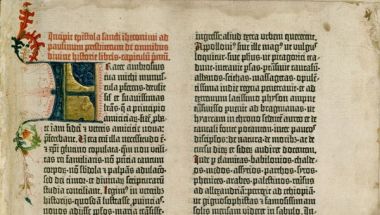Gutenberg Bible and Darwin's Origin of the Species to go on display in Cambridge
One of the first Bibles ever to be printed and a first edition of Darwin's Origin of the Species are among a number of priceless works to go on show at a landmark exhibition in Cambridge this week.

The Cambridge University Library is celebrating its 600th birthday by displaying some of the world's greatest literature. The iconic and influential works span more than 4,000 years of human thought, and include the world's longest poem, Shakespeare's first folio and an annotated version of Newton's Principia Mathematica.
Darwin's offering has famously been scribbled on by his children; the naturalist drafted the original manuscript of Origin from home, and apparently gave some of the pages to his offspring as scrap paper.
The Gutenberg Bible, of which there are only 49 in the world, was the first major work to be printed using movable type. It prompted the 'Gutenberg Revolution', where the spread of the printing press facilitated the rapid spreading of ideas across Europe and the globe. Cambridge University Library will put on display its copy of the Bible, which is one of only 21 complete volumes in existence, making it one of the most valuable books in the world.
"There are six lines of thought featured – revolutions in human communication, from clay tablets to Twitter, the evolution of genetics from Darwin to DNA, religious writings, understanding gravity, telling the story of history, and illustrating anatomy," Dr Emily Dourish, head of rare books at the library, told Cambridge News of the exhibition.
"Some of the treasures have not been displayed before, and they cover the spread of writing, from people scratching on animal bones right up to the present day."
"We have just run out of space and digitisation hasn't helped as much as you might think," Head librarian Anne Jarvis told the Guardian.
"It has enabled us to share our treasures across the world, but we still find that scholars like to look things up online, but then want to come here to handle the real thing."
Lines of Thought: Discoveries that Changed the World will open to the public on Friday, and runs until September 30.











